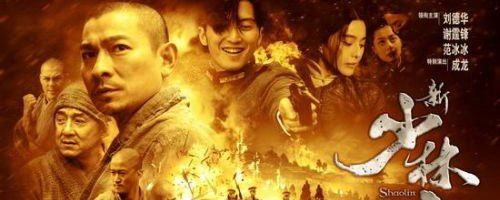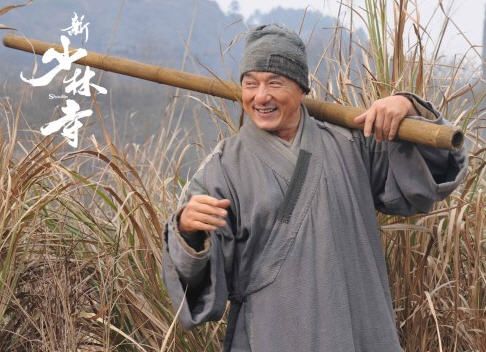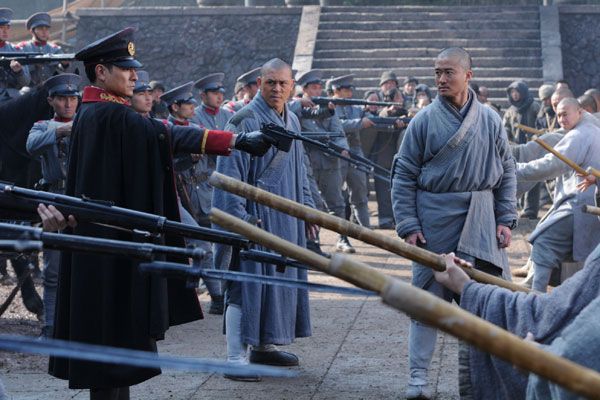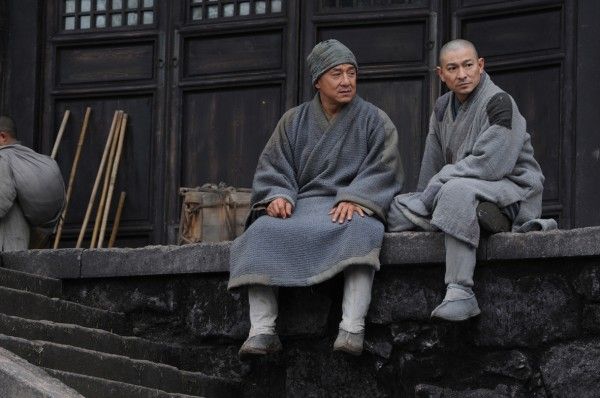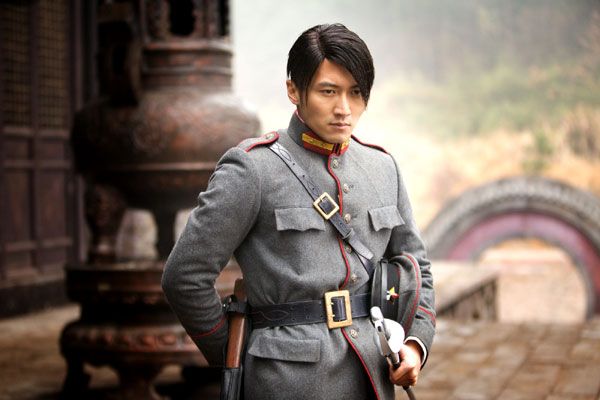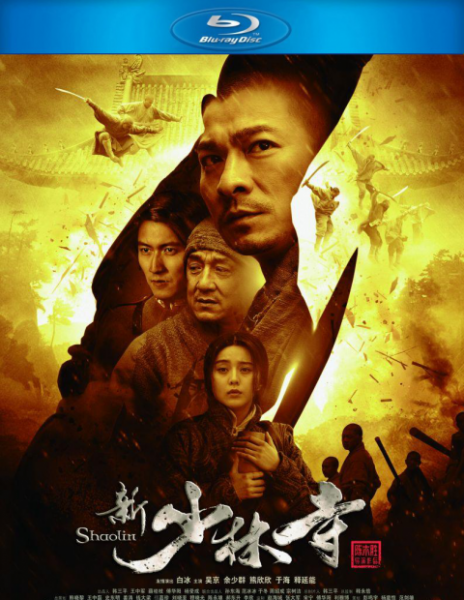As a practitioner of the martial arts, I love watching a kung fu film that shows not only technical mastery of the fighting discipline, but a cohesive understanding of storytelling and filmmaking. Then again, I also appreciate the low-budget, poorly plotted schlock of some of the earliest films, complete with unintentionally hilarious dubbing or closed captioning. Shaolin is more of the former and less of the latter in a flawed but overall quality kung fu flick. Starring Andy Lau (House of Flying Daggers), Nicholas Tse (The Stool Pigeon) and Jackie Chan in a remake of the 1982 original which debuted Jet Li, Shaolin tells the story of a Shaolin monastery caught in the transitory upheaval of rival warring factions, but is ultimately the tale of redemption for warlord Hou Jie (Lau). Hit the jump for my review of Shaolin on Blu-ray.
Set in Dengfeng, Henan province in China’s early republican era, Shaolin opens amidst the chaos of brutal fighting between the forces of rival warlords. The defeated warlord Huo Long flees to the relative safety of a refugee camp, but is forced into the sanctuary of a nearby Shaolin temple when soldiers flush him out. Refusing to adhere to Buddhist principles, Cao Man (Tse) rides his horse into the temple and engages the monks in combat. He is stopped only by his commander, General Hou Jie (Lau) riding in and chastising his second-in-command for behaving in such a manner. In ruthless hypocrisy, Hou Jie takes the possessions and land grants from the defeated General Huo Long and executes him within the monastery. Hou Jie later tells Cao Man, “When you have the upper hand, you must act or you’ll be dead.”
Thus the first act of Shaolin sets up the relationship between the two soldiers and establishes the sort of man Hou Jie is: confident, aggressive and relentless. In any great redemption story, the party who will eventually be redeemed must be shown to possess severe character flaws as well as the necessary qualities to earn redemption. Hou Jie has both of these in spades as he has already executed a rival in cold blood in a house of worship, continues to belittle Cao Man and remind the younger man of his subordinate position and plans an assassination of his lifelong friend and rival, General Song Hu, to pre-empt any attempt to sequester Hou Jie’s hard-won spoils of war.
However, Hou Jie does possess considerable national pride as he refuses to allow foreign investors to build a railroad through his new lands in return for cutting-edge weaponry. Hou Jie also shows tenderness toward his daughter and concern for his the well being of his wife (Bingbing Fan) if the ambush were to go wrong. And of course, it does, as Cao Man double-crosses Hou Jie in a power play meant to take out both of his rivals and leave him in charge. The aftermath of his betrayal serves to take everything Hou Jie covets (control, power, possession of not only resources, but of people) and strips them away.
After a dramatic chase that results in severe injuries to Hou Jie’s wife and daughter, the three arrive back at the monastery. Despite their best efforts, the monks are unable to save Hou Jie’s daughter and he threatens each of them with death for their failure. His wife, having recovered, blames his greed and arrogance for their daughter’s death and leaves him. With nothing left but his rage, Hou Jie stumbles through the lands around the monastery…and promptly falls into a boar trap.
Here we meet Wudao (Jackie Chan), the Shaolin monk responsible for cooking duties. Chan provides a welcome levity to the film and his character acts as a sort of mentor for Hou Jie. Shaolin director Benny Chan, who directed one of my personal favorites, Jackie Chan’s Who Am I?, has had a long history with Jackie Chan, who plays a small but pivotal role. Through Wudao’s intervention and the reluctant help from the monks of the monastery, Hou Jie is accepted into the temple to study Buddhism, kung fu and attempt to attain enlightenment.
Meanwhile, Cao Man is consolidating his new found power by exterminating anyone who remains loyal to Hou Jie and putting increasingly large bounties on the former General’s head. A more cutthroat version of his predecessor, Cao Man outcompetes the other warlords by trading access to his land for foreign weapons and sells his own people for slave labor. Under the guise of working on the railroad, Cao’s slaves are actually digging up Chinese artifacts to sell off to foreign collectors. In Hou Jie’s final step to attaining enlightenment, he comes across the open pits full of his dead countrymen and carts them back to the refugee camp.
The final act of Shaolin is literally the most explosive in terms of action sequences. It’s also the most fulfilling by way of the narrative as not only do the monks and soldiers square off in defense of the temple, but Hou Jie and Cao Man face each other in their final conflict. For reasons unexplained throughout the rest of the film, Cao Man has turned sadistic. Becoming drunk with power seems a stretch as to why Cao Man tries to drown Hou Jie’s wife in front of him, but it does the trick at pissing the former General off. Teacher and student have a final fight in the monastery as flaming wreckage falls all around them. In the end, Hou Jie pays the ultimate price for redemption as he sacrifices himself to save his student in hopes that he has learned from Hou Jie’s mistakes.
Although the monks eventually drive off the soldiers and defeat the foreign troops shelling the monastery, their temple is ultimately destroyed. Wudao and the villagers look back as they flee into the mountains, watching the smoke rise from their ruined home. Shaolin ends with a flashback between Hou Jie and his wife as he hands her the urn containing their daughter’s ashes; she forgives him and tells him he’s become a better man. The last scene is of the monks practicing their kung fu in the snow at a new monastery.
While the main story of Shaolin focused on the redemption of Hou Jie, there were some side plots that mainly served to add humor and a change of pace to the film. The back-and-forth dialogue between the monks as they trained was necessary to establish characters you actually cared about, making their sacrifices later in the film all the more worthwhile. However, these scenes appeared forced and disrupted the flow of the overall film. I did enjoy watching the monks play Robin Hood in the middle of the night to steal rice for the starving villagers and the “last stands” by a few of the monks at the end were quite memorable. While these scenes weren’t essential to the plot, they were a nice addition.
The action sequences overall were fairly well done. There was a minimal amount of wire work, but where it was present, it was obvious. Also, surprisingly, there was a lack of hand-to-hand fighting scenes in Shaolin, but the weapons fights more than made up for it. As the movie featured Jackie Chan, there was definitely one Chan-esque scene in which his character, Wudao, uses his lifetime experience of culinary techniques to defend himself and some of the children from Cao Man’s soldiers. While the kids yelled out things like, “Saute them like carrots and celery! Use your noodle-making skills to fight!” Chan used his usual combination of technique and humor to defeat the bad guys. While it was a cute scene, it was a little too silly for the big climactic battle. The best fights in the entire movie occurred between the head assassins of Cao Man and the senior brothers of the monastery; sadly, these were too few and far between.
The performances by Lau, Tse and Chan were spot on. Lau expertly portrayed the greed, anger, hubris and acceptance necessary on a journey from warlord to enlightened monk. Tse was utterly convincing as a ruthless warmonger who experiences an epiphany that leads him to question his ways. And Chan is as charismatic as always, providing a necessary comedic performance with even more subtlety than usual. If you’re looking for a pure action flick, look elsewhere, as Shaolin is a dramatic story of one man’s path to enlightenment framed within a historical backdrop and told through the conflict between war and the principles of Buddhism.
Extras
Three Additional Trailers
Deleted Scenes: (There seems to be enough material to make another movie.)
- The monks bring the wounded back to the temple and tell the Abbot of the warlords’ conflict.
- Hou Jie is having dinner with his wife and daughter in a scene that shows the softer side of the warlord.
- Monks are dishing out rice rations when they get an opportunity to teach two young boys the principles of Buddha.
- Two men attempting to rape a young woman are thwarted by one of the monks while he is making his nightly rounds stealing rice from the soldiers. (Rough cut as the sound is absent.)
- An extended training sequence of the monks practicing on the grounds, including a sparring match between the Senior Brother and his subordinate. (Sound is also missing during the fight and the wire is clearly present at one point.) Hou Jie also squares off against the subordinate monks who challenge him, but he refuses to fight back. (Wires are obvious here as well.)
- Hou Jie joins Wudao in the kitchen after losing the fight to the monks.
- Hou Jie is sharpening a knife on the river rocks while Wudao sleeps. He hides the knife in his boot.
- Hou Jie is repairing tents in the refugee camp when he is summoned by the Senior Brother who tries to make him leave. When Hou Jie refuses, they fight. (Wires are present here as well.) After feigning an injury, Hou Jie pulls the knife and stabs the Senior Brother in the neck, only to find that the blade has been removed from the hilt.
- Hou Jie helps to tend to the wounded, but the mother of a dying man recognizes him as the warlord and tries to assault him. Hou Jie manages to save her son with the Abbot’s help.
- Hou Jie explores a cave and finds empty crates piled in a heap. He drops his lantern and leaves a note behind.
- Two monks watch as more refugees come in. One of the monks is put in charge of a woman who has volunteered, the same one he saved earlier. The other monk sees his mother traveling with a group of refugees who appear to be more well-off than most.
- A young refugee attacks Hou Jie with a knife for killing his father. He turns out to be Song Hu’s son who was betrothed to Hou Jie’s daughter before his treachery.
Shaolin comes in at a run-time of 131 minutes. While there is an English audio option, I’d suggested sticking with the native Chinese language and opting for the English closed captions. A lot seems to get lost in translation and the dubbing does an unfortunate job of pulling the viewer out of the story.

